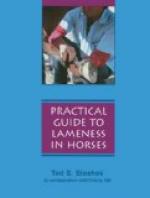[Illustration: Fig. 46—Oblique fracture of the femur of a 1,500 six-year-old draft horse. Showing shortening of bone, owing to a lateral approximation of the diaphysis because of muscular contraction. Photo by Dr. Edward Merillat.]
Symptomatology.—According to Cadiot and Almy,[40] “regardless of the location of femoral fractures, the subject is usually intensely lame, the animal frequently walking on three legs—fractures of the diaphysis are characterized by an abnormal mobility.”
As a rule, crepitation is to be recognized in fractures of the shaft of the bone, by passively moving the leg to and from the medial plane (adduction and abduction).
Fracture of the trochanter major is signalized by local swelling and evidence of pain; the forward stride is shortened because this movement tenses the tendon of the gluteus major (maximus) which is attached principally to the trochanter.
[Illustration: Fig. 47—Same bone as in Fig. 46 after about six months’ treatment. In this case Dr. Merillat employed a weight to counteract muscular contraction. It is noticeable that very little provisional callus has formed in this case, and in spite of unusual ingenuity and good facilities for caring for the subject, union of bone did not occur.]
Treatment.—Reduction of femoral fracture in the horse is practically impossible, and retaining the broken bones in coaptation is not possible by means of mechanical appliances. Consequently, prognosis is unfavorable in fracture of the body of the femur. When union of bone occurs, there results shortening of the leg and animals are rendered permanently lame. If the immediate region of the head of the bone is involved as well as in case of fracture of the condyles, an incurable arthritis ensues.
Where the trochanters are broken, chronic lameness and muscular atrophy is the result. Therefore, it is evident that, because of the manner of function of the femur, the leverage afforded by its great trochanter and its heavy muscular attachments, fractures of this bone in the horse do not terminate favorably.




